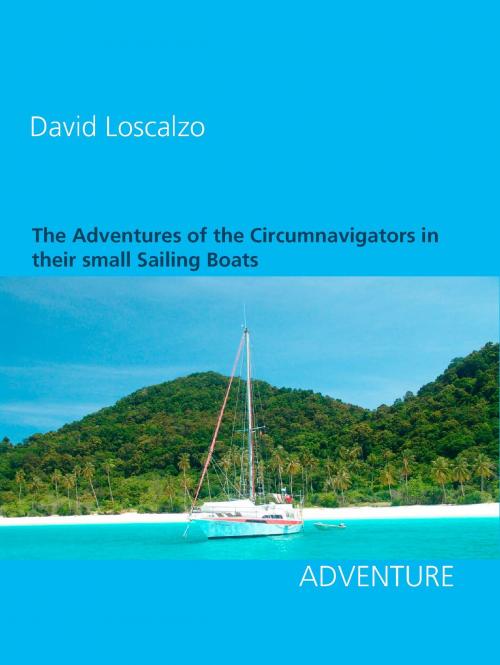| Author: | David Loscalzo | ISBN: | 9783739239569 |
| Publisher: | Books on Demand | Publication: | February 4, 2016 |
| Imprint: | Language: | English |
| Author: | David Loscalzo |
| ISBN: | 9783739239569 |
| Publisher: | Books on Demand |
| Publication: | February 4, 2016 |
| Imprint: | |
| Language: | English |
Within a few miles of my home in suburban Portland, Oregon, there are perhaps two dozen small ships all sailing vessels of thirty to forty feet in length in various stages of construction, with the ultimate purpose of carrying their owners and builders on world voyages. The shipyards are old barns, backyards, temporary sheds of wood framing and plastic sheeting. Even at the small moorage on Multnomah Channel where I keep my sloop, there are four such vessels being built in a corner of the parking lot, and there is a waiting list for the space. I am sure that similar activity can be found at every seaport of every maritime country in the Free World where the political, social, and economic status is sophisticated enough to stimulate the natural human urge to escape to a more simple life, or to indulge one's curiosity and restlessness by travel to faraway places. And for every ship abuilding there are perhaps a thousand or more secret dreamers (many of whom live hundreds of miles from the nearest salt water) who spend their leisure hours marking ads in the classified sections of metropolitan newspapers and boating periodicals, or prowling the marinas, yacht clubs, and small boat harbors searching for a ship in which to make their escape at a price within their dreams. Most of them, of course, will never get beyond the ad-marking stage; or if they do, most of their ardor will have been dissipated by the actual physical activity and the reality of inquiry. There is nothing new or unusual about this. Civilized man has endeavoured to escape to sea at least since the time of the Minoans, circa 1500 B.C. Daydreams like this are what help many over the small daily crises, the frustrations of the job, and that state of mental rebellion that Henry David Thoreau was trying to define when he wrote that most men lead lives of quiet desperation. Some of these owners, builders, and searchers have announced their intentions in advance, and are already savoring the heady stimulation of publicity and small notoriety which they hope to earn later. Others hold it as a secret ambition and will not talk about it, or if they do, they are vague about future ports of call and even departure dates. A few are building only what they refer to as "retirement boats," for which they have no conscious plans other than living aboard when the ship is finished and launched. These are the cagey ones. This book is about the adventures of some of these circumnavigators.
Within a few miles of my home in suburban Portland, Oregon, there are perhaps two dozen small ships all sailing vessels of thirty to forty feet in length in various stages of construction, with the ultimate purpose of carrying their owners and builders on world voyages. The shipyards are old barns, backyards, temporary sheds of wood framing and plastic sheeting. Even at the small moorage on Multnomah Channel where I keep my sloop, there are four such vessels being built in a corner of the parking lot, and there is a waiting list for the space. I am sure that similar activity can be found at every seaport of every maritime country in the Free World where the political, social, and economic status is sophisticated enough to stimulate the natural human urge to escape to a more simple life, or to indulge one's curiosity and restlessness by travel to faraway places. And for every ship abuilding there are perhaps a thousand or more secret dreamers (many of whom live hundreds of miles from the nearest salt water) who spend their leisure hours marking ads in the classified sections of metropolitan newspapers and boating periodicals, or prowling the marinas, yacht clubs, and small boat harbors searching for a ship in which to make their escape at a price within their dreams. Most of them, of course, will never get beyond the ad-marking stage; or if they do, most of their ardor will have been dissipated by the actual physical activity and the reality of inquiry. There is nothing new or unusual about this. Civilized man has endeavoured to escape to sea at least since the time of the Minoans, circa 1500 B.C. Daydreams like this are what help many over the small daily crises, the frustrations of the job, and that state of mental rebellion that Henry David Thoreau was trying to define when he wrote that most men lead lives of quiet desperation. Some of these owners, builders, and searchers have announced their intentions in advance, and are already savoring the heady stimulation of publicity and small notoriety which they hope to earn later. Others hold it as a secret ambition and will not talk about it, or if they do, they are vague about future ports of call and even departure dates. A few are building only what they refer to as "retirement boats," for which they have no conscious plans other than living aboard when the ship is finished and launched. These are the cagey ones. This book is about the adventures of some of these circumnavigators.















